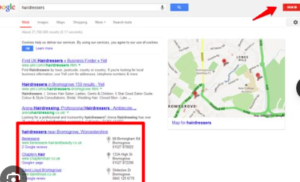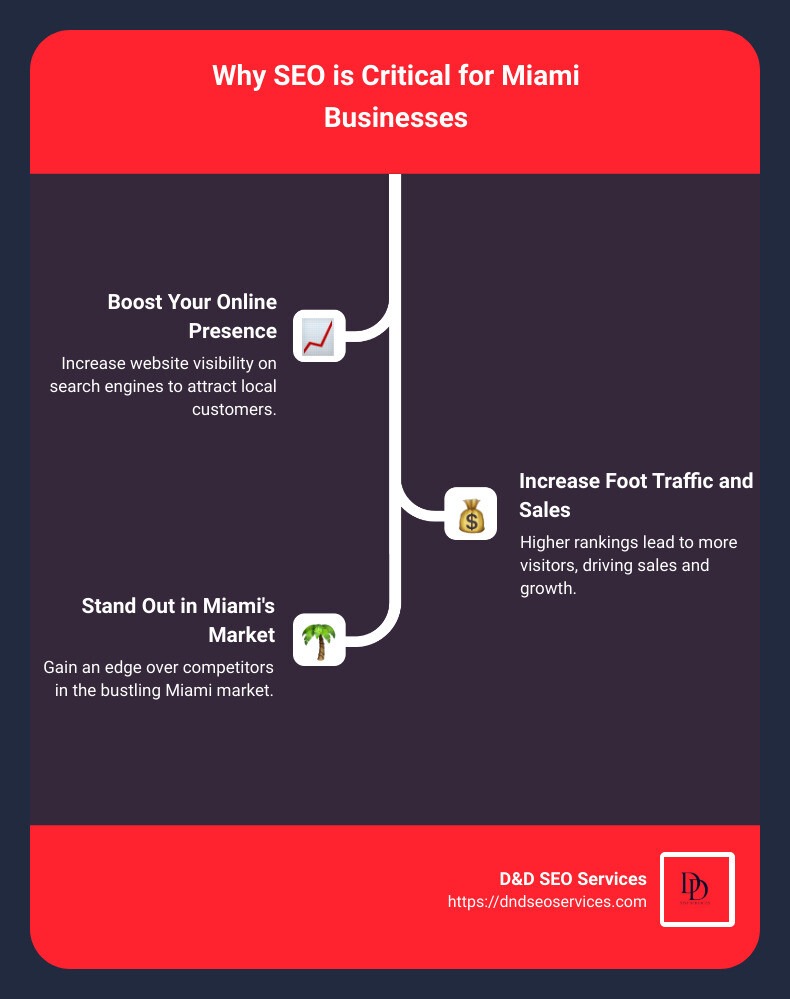97% of search engine users search online to find a local business. If users want to find a local business online, they turn to search engines first.
In a bustling landscape where every local business is vying for attention, mastering Local SEO is the linchpin to unlock potential customer engagement and drive foot traffic to your brick and mortar establishment.
From the subtleties of Google My Business to the nuances of mobile optimization, the art of refining your digital footprint is ever-evolving.
Imagine the edge you could gain by harnessing localized keyword strategies that catapult you to the top of the search engine results page.
Tailoring your online presence through insightful local SEO tactics is not just smart; it’s a strategic imperative in the era of smartphone searches and hyperlocal commerce.
Keep reading to embark on a transformative journey through the realm of Local SEO, where visibility meets relevance.
Unlock the Power of Google My Business for Local SEO

In the realm of Local SEO, a Google Business Profile acts as a linchpin for visibility, connecting the digital marketing efforts of a brand with the bustling traffic of Google’s search engine results page.
By meticulously setting up a Google My Business account, businesses are positioned on the online map, granting them the eminence akin to the yellow pages in a bygone era.
Beyond the set-up, the infusion of up-to-date business information and engaging posts is paramount.
This constant stream of fresh content does more than just inform; it entices potential leads, fosters trust with the online community, and signals to search engines the ongoing relevance of a local business.
Thus, embracing meticulous profile management is not just a recommended step, but an essential strategy for any business determined to outshine its competition in the local SEO landscape.
Set Up Your Profile Accurately and Completely
Embarking on the journey of Local SEO optimization begins with the essential task of setting up your Google My Business profile with precision. Every detail, from the accuracy of your address to the prominence of your business category, has a profound impact on how you appear within local search results and, by extension, influences the navigability of your customer’s journey.
Impeccable completeness in profile setup involves not only foundational elements like contact information and business hours but also integrating a well-crafted description that encompasses keywords relevant to your market. This careful attention to detail enhances usability and provides a robust foundation for your digital footprint on Google’s expansive platform.
Regularly Update Business Information and Posts
Consistency and freshness in content delivery mark the touchstone of effective Local SEO, and Google My Business is no exception. Regular updates to your business’s operating hours, services, and promotional offers signal to prospective customers and search engines alike that your business is active and attentive to current trends, thereby bolstering your local search engine rankings and the likelihood of garnering organic search results.
Furthermore, crafting timely posts on your Google My Business profile provides a snapshot of what’s new and exciting about your offerings. This ongoing engagement not only nurtures your connection with the online community but also acts as an invitation for consumers to revisit your profile, ultimately fostering brand loyalty and enhancing conversion opportunities.
Effective Keyword Strategy for Local Searches
An efficacious keyword strategy remains the cornerstone of Local SEO, serving as the compass that guides your digital presence to the forefront of local search engine results.
Businesses eager to gain traction in their local markets need to pinpoint and embed local keywords that resonate with their target audience, ensuring that their online space is fully optimized for relevance within the community.
By weaving these localized terms into both website content and metadata, businesses effectively alert search engines to their regional focus, carving out a distinctive niche and enhancing their visibility to customers seeking their specific services or products in the area.
Identify Local Keywords Relevant to Your Business
Initiating a local SEO campaign hinges on the ability to ferret out keywords that capture the essence of your business within its geographical context. Harness the capabilities of tools like Google Keyword Planner and SEMrush to distill down the search terms that your local clientele are most likely to type into a search engine.
Once you’ve isolated those targeted phrases, integrate them into the fabric of your website’s content with a deft hand—a sprinkle here in your metadata, a dash there in your anchor text—ensuring a natural flow that Google and prospective customers will find equally appealing.
Incorporate Local Keywords Into Website Content and Metadata
When the intricate dance of local SEO unfolds, the clever incorporation of local keywords into the lifeblood of a website’s content and metadata is both an art and a science. Strategic placement of geographically-tailored phrases within the rich tapestry of text on web pages not only caters to the user’s quest for local information but also serenades search algorithms with the sweet siren song of relevance, beckoning them to rank the site in question higher in search results.
Metadata, often the unsung hero of the SEO saga, wields quiet power, with title tags and descriptions acting as succinct billboards for the web page. Embedding local keywords into these crucial snippets can transform them into lighthouses that guide the vast ocean of digital searchers directly to a business’s virtual doorstep, amplifying the drumbeat of organic visibility in an ever-competitive digital marketplace.
Leverage Local Business Listings to Boost Visibility
In an arena where visibility is the currency of success, strategically navigating local business listings can offer a substantial return on investment.
Establishing a robust presence on major directories like Yelp and YellowPages serves as a beacon for potential customers, guiding them through the quagmire of choices to your door.
It’s not merely about showing up; ensuring consistency across all online business listings is vital for cementing credibility and reinforcing your brand.
By crafting accurate and harmonious listings, small businesses can carve out an enviable niche within their local markets, turning mere presence into a force that commands attention.
Create Listings on Major Directories Like Yelp and YellowPages
Stepping into the arena of major directories like Yelp and YellowPages, small businesses unlock the potential to magnify their local reach. The act of establishing listings on these platforms is akin to planting a flag on the summit of local visibility, beckoning a stream of potential customers toward your virtual doorstep.
With a strategic approach to creating these listings, complete with all relevant business details and a consistent NAP (Name, Address, Phone Number), businesses tap into the lifeblood of local searches. These directories, often gateways for local search engine optimisation, channel valuable web traffic and enhance the findability of businesses within community-based searches.
Ensure Consistency Across All Online Business Listings
Maintaining uniformity in your online business listings is a critical element of local SEO management. It’s essential to ensure that every detail, from your operating hours to your zip code, remains consistent across all directories to build a seamless and credible digital presence.
When discrepancies arise in your listings, it can erode customer trust and lead to a fragmented brand image, negatively affecting your local search engine performance. Regular audits and updates to your profiles help safeguard your reputation and strengthen your local SEO efforts.
Optimize Your Website for Mobile Users
With an increasing number of consumers turning to mobile devices for their search inquiries, local businesses must prioritize mobile user optimization to stay relevant and accessible.
As we delve into the vital aspects of responsive web design and site speed enhancement, it becomes evident that these are not mere embellishments but necessities for thriving in the local SEO realm.
A website optimized for mobile compatibility ensures smooth navigation for users on-the-go, while improved site speed enhances user experience, reducing bounce rates, and elevating your business’s position on search engine results pages.
Together, these optimizations forge a more inviting and efficient digital storefront that aligns with the habits and expectations of the modern mobile audience.
Implement Responsive Web Design for Mobile Compatibility
Responsive web design has emerged as a non-negotiable feature for businesses striving to master local SEO. It ensures that a website dynamically adjusts its layout and content to fit across various screen sizes, from desktops to smartphones, providing an optimal viewing experience for every user.
An expertly implemented responsive design eliminates the need for mobile users to pinch and zoom, allowing seamless interaction with your web page. This fluidity in design not only enhances usability but also signals to search engines that your website is thoughtfully tailored to meet the needs of a mobile-centric audience, a factor that significantly bolsters local search rankings.
Improve Site Speed and User Experience on Mobile Devices
Enhancing site speed is an essential factor for enriching user experience on mobile devices, where swift load times are inherently expected. By optimizing images and streamlining code, businesses can noticeably diminish load times, which in turn can decrease bounce rates and encourage longer visits, contributing positively to SEO ranking factors.
Investing in mobile user experience transcends mere site speed; it extends to creating an intuitive user interface that promotes easy navigation and interaction. Responsive buttons, legible fonts, and a friendly layout are critical considerations that help convert casual browsers into engaged visitors, potentially increasing lead generation and customer retention rates.
Harness the Power of Location-Based Content Marketing
Stepping confidently into the intricate dance of LOCAL SEO involves courting the attentions of a localized audience through content that resonates with their specific experiences and interests.
Strategic location-based content marketing is a critical element in the tapestry of techniques that businesses must leverage.
It involves the deliberate creation of articles, blog posts, and various media that speak directly to the heart of local issues, events, and milestones.
In 2024, as the competitive landscape of digital marketing continues to evolve, tapping into the pulse of your local community with well-crafted, resonant content is more important than ever, serving as a beacon that not only draws your target audience closer but also signals to search engines your deep-rooted connection to the area you serve.
Create Content That Addresses Local Issues or Events
Invigorating your local SEO strategy with content that highlights regional happenings and concerns sets a business apart as an involved and informed entity within its community. By accentuating local festivities, commemorations, or public issues in your content, you cement your brand’s reputation as a proactive member of the local landscape, actively contributing to the communal narrative and drawing a more engaged clientele.
Engaging directly with the fabric of local life through your content marketing efforts can yield a significant uptick in regional interest and web traffic. When a business shares insights or stories about area events, it doesn’t just resonate with the zeitgeist of the local populace; it also garners the attention of search engines that favor regionally relevant material, sharpening your local SEO edge.
Conclusion
Mastering Local SEO in 2024 is a game-changer for businesses aiming to dominate their regional market and enhance their online visibility.
Establishing a comprehensive Google My Business profile and maintaining consistent, up-to-date information across various directories solidifies a brand’s local presence and credibility.
Integrating targeted local keywords into the website’s content and metadata, coupled with responsive web design, is essential to connect with a mobile-first audience.
Finally, crafting location-based content that resonates with community interests and events firmly anchors a business within its local landscape, improving both search engine rankings and customer engagement.






